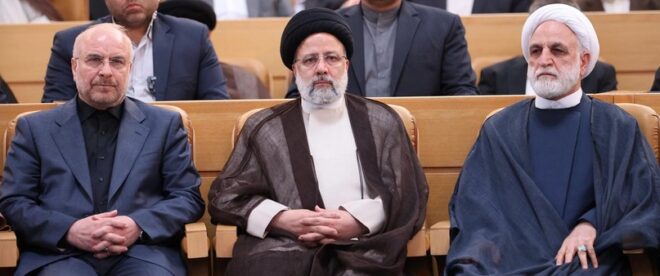iranintl – While enjoying their long Norouz holiday, politicians in Iran have been reflecting on the country’s economic, social and political crises and anticipating a bleak situation in the year ahead.
Their reflections on the past are primarily centered around the recent highly controversial election, which the country sees as a nightmare that it has partially left behind. However, as the holidays conclude, the nation anticipates the continuation of this nightmare with a run-up election in May.
The heavily manipulated vote for parliament on March 1 saw hardliners barring most other regime insiders from running for office. As a result, the election experienced the lowest turnout in 45 years, with widespread public apathy keeping a large majority of voters away from ballot boxes.
Khabar Online website in Tehran conducted brief interviews with ten Iranian political figures, seeking their perspectives on the best and worst events of the Iranian year that concluded on March 20.
Among the respondents, which included former lawmakers, a former state TV Chief (Mohammad Hashemi), and various politicians from different affiliations, the overwhelming consensus identified the March 1 election as the most adverse event of the past year.
Former judiciary head Sadeq Amoli Larijani, who lost the Assembly of Experts election in Mazandaran Province, and Majles Speaker Mohammad Bagher Ghalibaf were highlighted as notable losers. Ghalibaf, who secured over 1.2 million votes in 2021, saw a drastic reduction to just over 400,000 votes in 2024. However, respondents highlighted that almost everyone in the country could be considered a loser.
Reformist politician Gholam Ali Rajai expressed a sentiment shared by many, stating that even a destructive earthquake would have been preferable to the March 1 election. The devastation left behind by an earthquake could be compensated, but the losses caused by this election, which brought radicals to power, will have serious long-term consequences, he said.
Additionally, concerns were raised about the ongoing economic crisis under President Ebrahim Raisi’s administration, as well as security issues highlighted by terrorist attacks in Shiraz and Kerman in the past year. Only one respondent, former presidential candidate Mostafa Hashemi Taba, singled out the government’s neglect of environmental issues as the most significant failure of the past year.
When asked to grade the government’s performance on a scale from zero to 20, opinions varied widely. While three hardline politicians, including Islamic Coalition Party member Hamid Reza Taraqqi, awarded grades between 14 to 18, others were far less generous, with two politicians assigning grades below 10, including two zeros.
Evaluating the performance of the outgoing parliament, except three hardline former lawmakers, the other seven respondents branded the parliament a total failure.
Meanwhile, three hardliners named the launching of a satellite to the space as the country’s best event in the past year. Reformist Rajaei said winning the Nobel Peace Prize by jailed activist Narges Mohammadi was the best that happened to Iran last year.
Looking at the future, in another Interview, General Hossein Alai, a former commander of the IRGC naval Force and a reformist politician, said that the Islamic Republic needs to bring about a meaningful change in its economic and political policies and conduct.
Alai reiterated that significant changes are needed in the government’s domestic and foreign policies as well as in the areas of economy and the way the government appoints its managers. He added that the government should do away with the arbitrary vetting of election candidates by the Guardian Council so that the people can believe that they can determine their own fate.
 Shabtabnews In this dark night, I have lost my way – Arise from a corner, oh you the star of guidance.
Shabtabnews In this dark night, I have lost my way – Arise from a corner, oh you the star of guidance.



